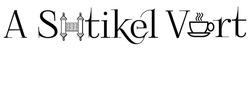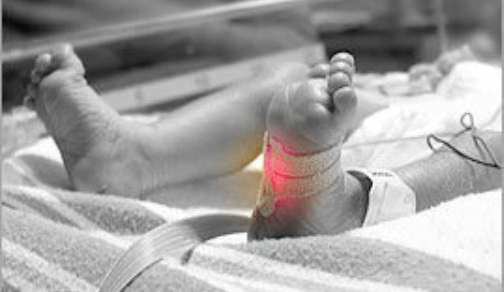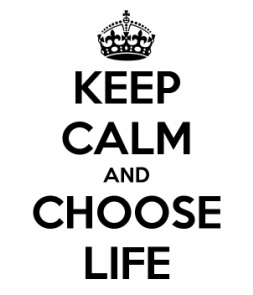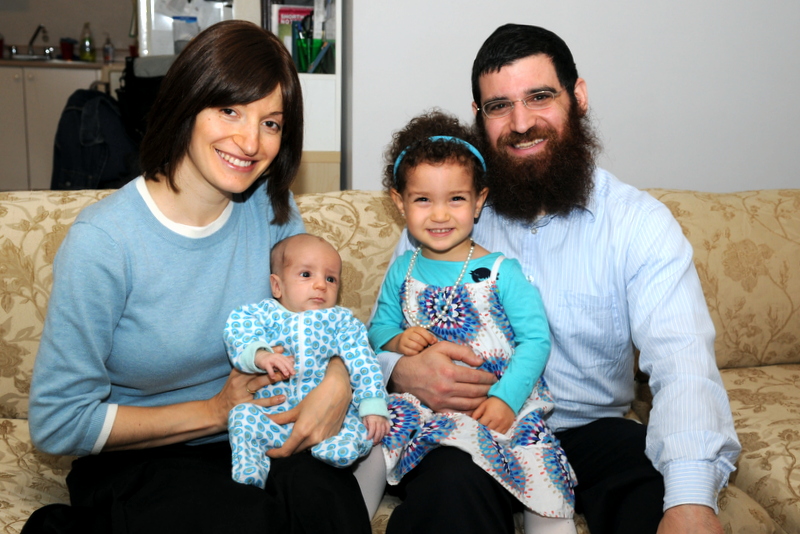Immediately after my son, Shmuel Abba, was born, he was rushed to the Neonatal Intensive Care Unit (NICU). It was only after over an hour that the nurse asked me if I wanted to go and see him. Following the emergency caesarean, my wife Ettie was still under general anesthetic and I wasn't sure when she was going to be conscious enough to travel to the NICU, so I decided to say hello to our little guy and let him know that his parents were nearby.
Nothing could have prepared me for what I was to see when I walked into the little six by six room that he was in. And when I say nothing, I literally mean nothing. He was laying in what looked like a clear plastic bathtub, and had wires hooked up to his stomach, legs, and arms. He had a breathing tube in his throat because he couldn't breathe on his own. There were these little suction cups with wires attached to his head, which I was told were to monitor his brain for seizures.
There were at least five different people scribbling furiously on sheets of paper recording numbers, intensely talking on the phone, and pressing buttons on various machines that kept beeping. As I stepped through the door way, it was as though the sea parted and everyone made room for me so that I could stand next to him. His eyes were closed and his breathing rhythmic. I didn't know what to do, think, or say...so I cried. I mean, I really, really cried. I told my son that I loved him and that he was going to be okay. Then I started to think that perhaps my uncontrollable weeping was going to scare him, or worse make him feel as though there wasn't any hope. But there was hope...right?
I stood before my son momentarily frozen uncertain what my next move would be. It felt as though time had ceased and I wasn't sure what was supposed to happen next, or what I should do. The fight-or-flight response (also called the fight-or-flight-or-freeze response) is a physiological reaction that occurs in response to a perceived harmful event. Something that threatens a person's very survival. I knew right then and there that if I didn't do something, this difficult situation could easily overtake me.
And so I made a plan. With tears streaming down my face, I decided two things. Number one, I wasn't going to cry again the entire time that he was in the hospital, no matter what. It was going to be my mission to be b'simcha (joyful). Number two, I was going to be overflowing with emunah (faith) and bitachon (trust). Anytime someone asked me how my son was doing, I would reply that he was going to have a full recovery and that Hashem would heal him. I simply would not accept anything less. I realized that these were two very bold and decisive choices to make and that I would be tested for the duration that he was in the hospital. But I also knew that I needed to be strong for my son, for my wife, for my daughter, for my entire family...and for myself. I couldn't allow myself to freeze or flee; I was going to fight.
I needed some serious inspiration to keep my spirits motivated and my faith strong. Thankfully, I had been listening to different Torah classes daily and had been learning on a regular basis. I cannot describe how incredibly helpful this was. In such a challenging time it was not general inspirational ideas (such as G-d loves the Jewish people, or everything happens for a reason) that I needed but rather specific ideas I could rely on to propel me forward. So for the next two weeks the following four thoughts kept me strong, unwavering in my faith, and with a dry eye.
The first was a story about the Baal Shem Tov (the founder of the Chassidic movement) which I had heard just weeks prior. Two men were having a discussion in shul with regards to one owing the other money. It became quite heated and the man who had lent the money to the other said, "If you don't pay me back I'm going to tear you apart like fish!" Hearing this, the Baal Shem Tov walked over to the two men and put a hand on each of their shoulders. They were instantly transported to a higher world where they saw a vision. One of the men was a bear and he was tearing apart the other man who was a fish. He was literally tearing the man apart. The Baal Shem Tov took his hands off the men and they found themselves back in the shul. They were both sweating and anxious due to what they had just witnessed. The Baal Shem Tov explained, there is a place called the world of speech, where everything we say becomes a reality. When you tell your fellow man that you are going to tear him apart like a fish, on some level, you have really done so. You must think about what you say, less it become a reality! And so, I wasn't going to let anything negative pass my lips. My son's reality was going to be one of a complete recovery.
The second was a saying that Ettie's grandmother, who our dear Bayla is named after, used often. She would say, "If Hashem wants, a broom can shoot!" It sounds more eloquent in Yiddish. It means that nothing is too difficult for G-d and that if He wants the impossible to occur, then it will. Surely, healing my son was easier than making a broom shoot, I reasoned.
The third was a response that the Lubavitcher Rebbe wrote to someone experiencing a challenge. The Rebbe wrote to the person, "Regarding your worry, that my father-in-law has already answered you that everything will be okay. You have two choices; you can continue to worry about the outcome and when it ends in a positive way as my father-in-law said, you will be upset that you wasted so much time worrying. Or you can think positively and when it ends for the good you will be able to say, look at how well I dealt with this difficult situation!" I knew my son was going to be okay. I was praying to G-d continuously, and had written a letter to the Rebbe for his blessing. I was not going to waste any precious time worrying.
Lastly, I thought about a sicha (talk) of the Rebbe with regard to Moshe Rebbeinu. In parshas Shemot we read about how Moshe Rebeinnu saw an Egyptian whipping a Jewish man for not working hard enough. Moshe defended the Jew and in the end killed the Egyptian. The next day Moshe saw two Jews (one whom was the Jew that Moshe had saved) arguing and he asked them why they were fighting. One of the Jews asked Moshe if he was going to kill them, like he had killed the Egyptian. When Moshe heard this, the Torah says, ‘And Moshe feared, and said: “Indeed, the thing is known.”’ Meaning that the news had traveled throughout the land and Pharaoh was aware of what had happened.
Seemingly the verse is backwards because it says that first Moshe was fearful, and then that indeed the thing is known. The usual order is that first something happens, and then as a result of that occurrence a person becomes afraid. So it would have made more sense if it had said that everyone knew what happened and therefore Moshe was afraid. From here we learn the importance of thinking in the positive and having complete bitchon (trust) in Hashem, that not only will everything turn out for the good, but that the situation itself is a necessary one and is for the good itself. What we can do is to speak only from a perspective of faith and trust.
I decided I wasn't going to be afraid because there was nothing to be fearful of. I wasn't driving the bus, Hashem was. No point in my being a backseat driver (I dislike those anyway, especially when I am driving). Instead, I made the firm conviction to say Tehillim, pray, and be the perfect passenger; knowing that the destination was a positive one, the right one, and for whatever reason, my esteemed Driver was taking an alternate route.
These four ideas gave me enough resolve and fortitude that I was able to navigate those two difficult weeks. I advocated for my son when doctors were not really listening, I was vigilante in monitoring his machines and was not afraid to ask a nurse passing by if a particular machine's beeping was okay, and when I thought that the position of his plastic bathtub was too close to the door because he might get a draft, I asked the nurse to move him over so he would be more comfortable.
Time did move forward and soon enough we found ourselves erev Yom Kippur wondering what our plan would be. Shmuel Abba was scheduled to have a critical MRI on his brain mid-day and we were waiting for the results and discussing our options. Would I take Bayla to shul back in our community? Would friends look after Bayla and I would stay in the hospital with Ettie? Was the hospital serious about discharging Ettie, in which case she herself would not have a room to stay in? We were expecting preliminary results within 6 hours and the detailed report within 24.
Miracle of miracles, the doctor came and spoke to us two hours before the sun was going to set and the holiest day of the year would begin. So when he told us that our son was being discharged and that because the MRI had shown such positive results that there was no need for follow up with the neurology department as Shmuel Abba grows, I needed to ask him to repeat himself; before quickly packing everything and making our way to the car before someone told us that we actually needed to stay.
We cut it close that year. We arrived at shul less than an hour before sundown. As everyone else solemnly recited Kol Nidrei (annulment of vows) I was humming Napoleon’s March in my head. No, really, to be truthful I was humming it out loud. I had already had two weeks of Yom Kippur. So for me, when the Torah scrolls were taken out of the ark and carried around the shul, it was because it was time for hakofos, it was time to celebrate with unadulterated elation. Mixed with the unreal feelings of joy and happiness was working out feedings with my son (he was only taking bottles and because he had a tongue tie it was very slow going), Bayla needed a lot of attention, and Ettie needed a lot of rest.
So before I knew it, 25 hours passed and Havdalah was being made. I wanted to say something to our amazing community which filled the room. They had davened for my son, many of them taking on extra mitzvahs in his honour. I started to say how thankful I was and tell them of the tremendous hakaras ha'tov (intense gratitude) I felt for all they had done and that Hashem made possible.
And I started to cry. As I thought about all my son had been through, the strength he had at such a young age, and how many people he had inspired in just 12 days, my only avenue to express my innermost emotions was to cry. This time, I let the tears flow and felt their warmth as they slid down my cheek. I managed to finish my thank you and glanced at my wife, knowing that she understood what I felt, and felt what I understood.
What came next was an unbelievable and memorable Sukkos. Shmuel Abba's Bris took place on the first day of chol moed Sukkos (the same day as Ettie's grandmother’s yarzeit, whose father Shmuel Abba is named after). The Sukkah was overflowing with people and emotion as my son took his proud place amongst the Jewish people. Though the weather was somewhat windy and cool, I was filled with warmth. In that moment, I thought about the Divine Providence involved in this miraculous story and everything that brought us to this serendipitous moment in the Sukkah.
Sitting there, I thought about the laws of building a Sukkah. A Sukkah at minimum must have two full walls and part of a third (which must be at least 3.2 inches). This is satisfactory, however, you're not safe from the affect of the weather. The next best thing is to have three full walls. This provides stability, yet lacks complete security; because you are still left open on one side. The best Sukkah, and indeed the most beautiful one, is one with four complete walls. Here, you are safe, stable, and secure.
The walls of a Sukkah can be compared to the different greetings one might give a close friend after not seeing them for a long time. Is a handshake enough when reuniting with a loved one? Certainly not; this is like two walls, simply not kosher. You could get by with putting your arm around their shoulder (your body is one wall, your arm the second, and your hand which just wraps around their other arm as the small part of the third wall). But this doesn't accurately depict how you feel. Sometimes men do this thing (you've probably seen it) when they greet each other. They do a one armed hug where one arm goes around the other person and with the second hand they pat the person on the back. This is like a Sukkah with three full walls; it's warm, stable, but lacking a true sense of unity. But a hug, a real hug where you embrace another and momentarily hold it; feeling the protection that love has brought: that is the best Sukkah you can make.
I realized that the entire 12 days that Shmuel Abba was in the hospital, Hashem had me in a hug. The four ideas which kept me going were representative of the four walls of a Sukkah, providing me with protection, and guiding me through my own personal desert. I realized that it wasn't that Hashem had suddenly embraced me, but that I allowed Him to do so fully, unconditionally, and with both arms.
We were all joined in the Sukkah, celebrating my son's bris, and it was moments before I was to thank everyone for coming to join in our simcha and share a small Torah thought. But just before I rose to speak, I cried. It was just a tear or two that peaked out of my eye and slowly fell down my face. I didn't cry because I was sad, and I didn't cry because I was happy. I cried because I was cradled in the arms of our Father, Avinu Malkeinu, in the most kosher Sukkah that Torah law describes, and I finally understood what it means for there to be nothing else but G-d, and that G-d is only good.




 RSS Feed
RSS Feed
